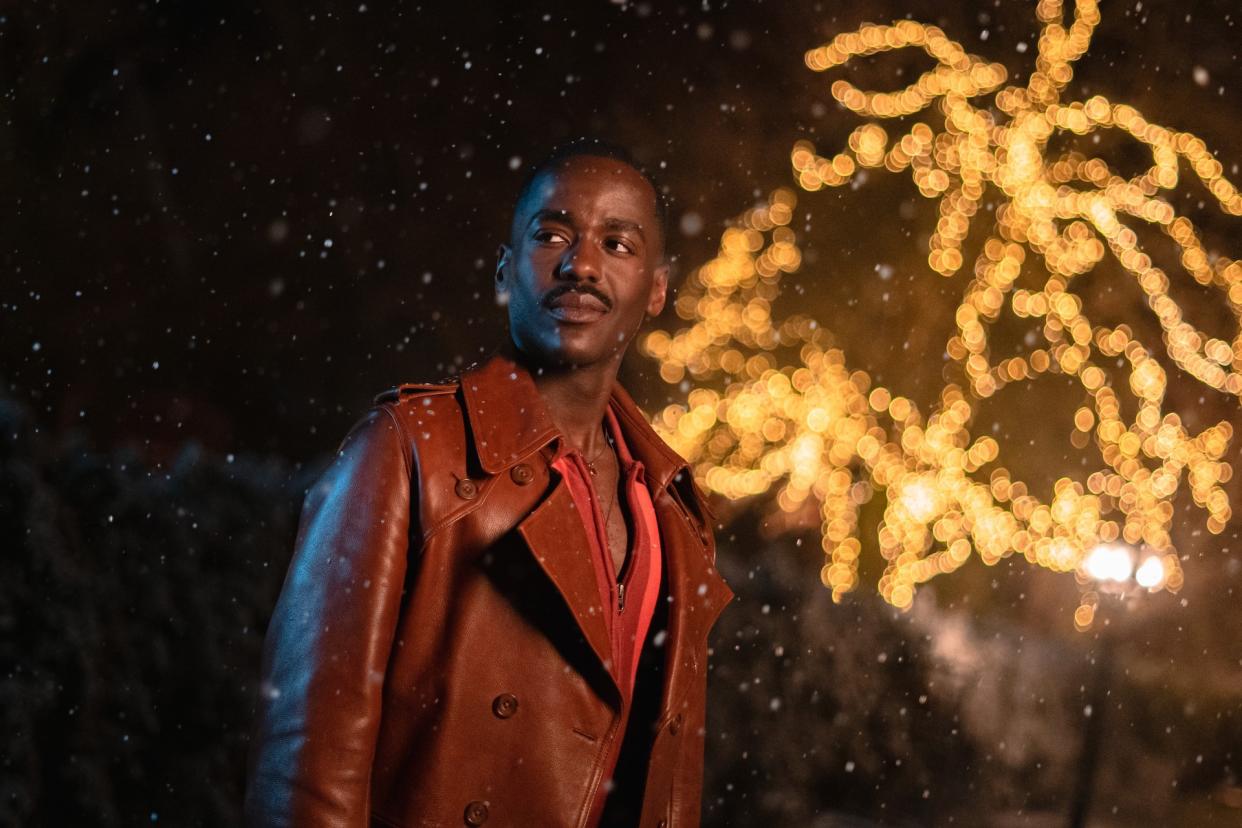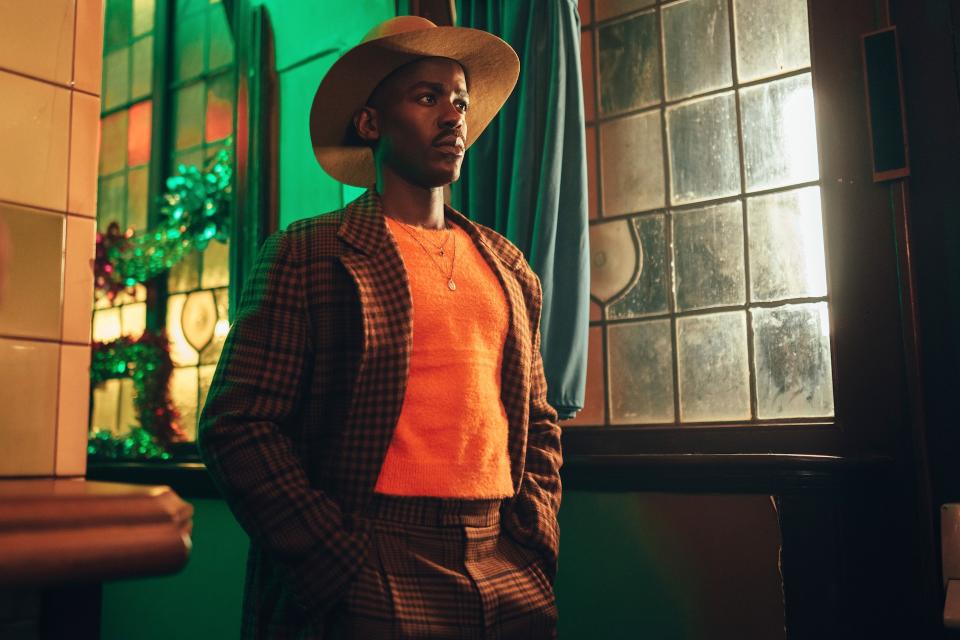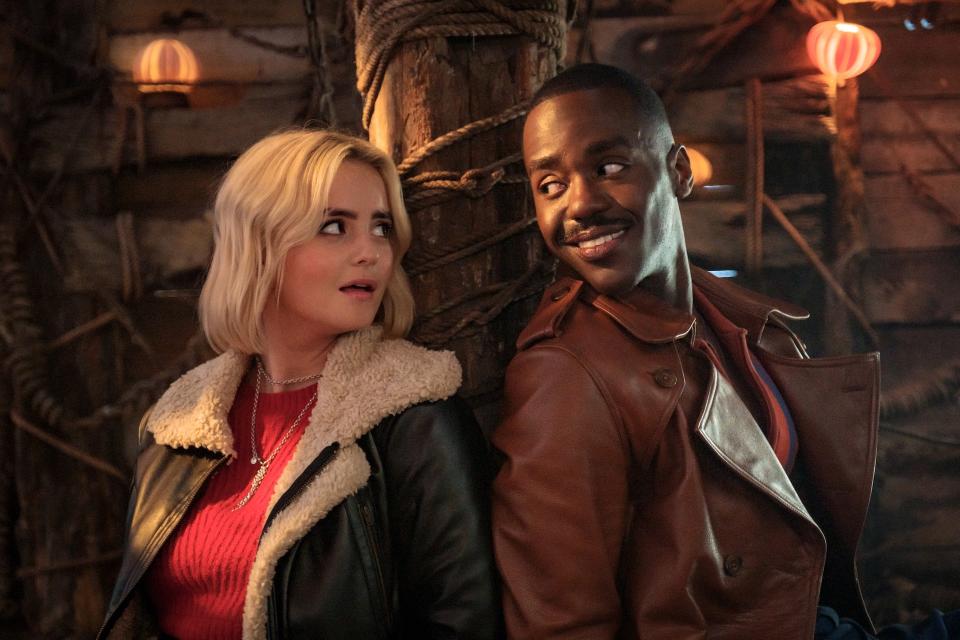The First Black ‘Doctor Who’ Can’t Be a Color Blind Role: Four Wishes for Ncuti Gatwa as the Time Lord

- Oops!Something went wrong.Please try again later.
- Oops!Something went wrong.Please try again later.
- Oops!Something went wrong.Please try again later.
The Doctor we viewers meet as hero of the latest “Doctor Who” Christmas special is unlike any other we’ve met in the 60-year history of the character.
He’s suave in a non-geeky way. He can command a dance floor. He can actually sing. And he’s a Black man.
More from IndieWire
'What If...?' Is the Only Project Delivering on Marvel's Multiverse Promise
Inside the Harrowing Puppet Show at the Center of 'Fargo' Episode 7
After watching Ncuti Gatwa’s impressive debut as the first Black, male incarnation of the Time Lord hero at the center of the BBC’s venerated science fiction franchise, this Black male TV critic is fascinated and hopeful at the possibilities that lie ahead.
But I’ve also got a few other fervent hopes — deep wishes that have been rolling around my mind ever since I first stumbled on The Doctor as a fan in my childhood, watching Tom Baker as the Fourth Doctor, ambling about like a shock-haired, spacefaring, time traveling version of Gene Wilder, in reruns which aired on Chicago’s public television station way back in the mid-to-late 1970s.
These are wishes which have been tempered by watching what happened to the last landmark iteration of The Doctor — the only female version — played by a game and perpetually underserved Jodie Whittaker. Too often, watching her episodes felt like suffering through an exercise in promise unfulfilled, as clumsy storytelling and terrible scripts came together in an awful conspiracy to trap Whittaker’s Thirteenth Doctor in underwhelming adventures unworthy of her presence.
This column will lay out what I hope those guiding “Doctor Who” these days accomplish with this new character. Call it a set of Christmas wishes for one of the best creations in science fiction history. And an earnest prayer of sorts for the first Doctor who, like me, reflects a people whose skin is darker than blue.
Respect for a Smooth Transition
Before outlining my wishes, however, I want to tip my critic’s hat to showrunner Russell T. Davies for what he has already accomplished.
Returning to a franchise he had already revolutionized once — reviving “Doctor Who” in 2005 after a 16-year hiatus and running it until 2010, supervising the original tenures of Christopher Eccleston and David Tennant as The Doctor — Davies is truly the Who whisperer. A man who knows how the franchise ticks as well as anyone alive.
That’s why, when I heard Davies planned a series of three “Doctor Who” specials starring Tennant returning as the Fourteenth Doctor leading to Gatwa’s introduction, I took a deep, calming breath.
Sad as I was that there seemed to be the need for this kind of hand-holding to ease Whovian fans into episodes with a Black Doctor, it all made a certain kind of brutal, showbiz sense. After the turbulence of the Whittaker years, it was smart to put some space between her version of the character and Gatwa’s debut with an actor “Doctor Who” fans unquestionably loved, to give some time to adjust.
If you’ve read this deep, you must already know that The Doctor is a time travelling, centuries old alien who “regenerates” every so often into a new face and body. Inside the world of the series, it means The Doctor can emerge from deadly trauma as a new being, with a bit of the memories and personalities of previous versions laid on top of a new person. In the real world, it means the production can and will replace actors if they get tired of the role or if the audience tires of them.
And every new performer chosen seems to exemplify a point of view the series will attempt to explore with the new face they have acquired.
Back in the original series’ days, that meant Jon Pertwee’s dashing, action-oriented ‘70s-era Third Doctor was a perfect counterpoint to the James Bond-inspired spy heroes clogging TV and films of the day. When Matt Smith came along as the Eleventh Doctor in 2010, the show got a 20-something with sex appeal to woo a new generation of “Doctor Who” fans.
This moment, we have Ncuti Gatwa, with his first Christmas Day special, “The Church on Ruby Road.” And the question arises: what point of view will “Doctor Who” be exploring now?
Wish #1: Don’t Shy Away from The Doctor’s Blackness
It’s tough to describe the thrill I felt listening to the opening lines of Gatwa’s first episode, hearing a voice with an accent that felt like a seamless fusion of his journey, as an African-born, Scotland-raised actor.
Finally, a hero who looks and feels more like me than any Doctor I’ve seen before.
It’s obvious from the early moments of the episode, there are elements of his identity the show will definitely lean into. Gatwa only recently came out as queer in real life, and the first episode depicts him as a Doctor who seems to draw strong fashion choices and attitude from gay culture, which makes the character more vibrant and distinctive.
But I also hope the show takes time to explore what it will mean to be a Black man flipping about through time on an Earth where people who look that way have often been marginalized and oppressed.
Beyond that, one of the strengths of “Doctor Who” is how ultimately British it is. The Doctor isn’t just an alien who loves Earthlings — he loves British people enough to constantly return there, of all the places in the cosmos he could be, learning and reflecting their culture through all off his various selves. So it’s time for The Doctor to face what it means to be a Black man in modern Britain, too.

And this isn’t just about making people like me feel more included. Authentic depictions of identity create characters who feel more real, while introducing people outside that cultural space to new and compelling things. Making a Doctor who recognizes his blackness will make the character stronger and his story arcs more interesting. For everyone.
Wish #2: Don’t Make Chibnall’s Mistake
The greatest weakness of the stories crafted by former “Doctor Who” showrunner Chris Chibnall for the Whittaker era was the seeming insistence that turning one of the most enduring male heroes from British science fiction into a woman made little difference to the character.
Those episodes seemed to turn away from the biggest thing that made the character unique — her new identity as a woman. I never thought it made much sense to have a man overseeing the episodes where The Doctor would emerge as a woman, but whether through fear of upsetting the fanboys or an unwillingness to truly see things from a different perspective, it always felt to me like the show was holding back from offering a Doctor who was fully in her feelings and identity.
Wish #3: Don’t Bring Back Tennant for a Good, Long While
Fans will note that Gatwa’s Doctor appeared through a type of regeneration we had never seen before; he split off from Tennant’s Fourteenth Doctor — leaving two separate beings, instead of one who replaced another.
That move felt a bit like another backup plan readied in plain sight, just in case Gatwa’s version of the Doctor tanks so bad they need to call in the old guard again. I hope that wasn’t the case; Gatwa deserves years to build this character in the same way Tennant did, without the spectre of a beloved predecessor hanging over his shoulder.
Wish #4: Empower Black Writers and Storytellers to Help
As a Black critic, I feel I can sometimes sense when writers who are not Black struggle to craft Black characters. These characters are sometimes surprised by things Black people know well — like racism — and feel somehow restrained in ways that people who know their culture rarely are.
On the NBC show “This Is Us,” they seemed to avoid that problem by empowering talented Black writers to serve as producers and directors, not just writers. So they had the agency and creative space to provide authentic storylines and reactions for all the characters — but particularly the characters of color.

I’m hoping “Doctor Who” might undertake something similar, unleashing writers, directors, and guest stars who have been waiting to bring challenging science fiction stories about blackness in Britain to the right creative home.
These wishes are a tall order. And they may sound silly to fans who insist The Doctor is above such earthly concerns as race.
But the great, delicious fun of “Doctor Who” is how the series often turns cosmic, alien environments into modified reflections of English culture. And by creating a character who changes identities so often, the show has placed the identity of its powerful, charismatic hero at the heart of every story.
So I’m hoping the show does right by this one aspect of the new Doctor’s identity. And in the process, creates a hero the franchise — and TV itself — has never seen before.
Best of IndieWire
Quentin Tarantino's Favorite Movies: 60 Films the Director Wants You to See
Where to Watch This Week's New Movies, Including 'The Iron Claw' and 'All of Us Strangers'
2023 Movies Shot on Film: From 'Oppenheimer' to 'Killers of the Flower Moon' and 'Maestro'
Sign up for Indiewire's Newsletter. For the latest news, follow us on Facebook, Twitter, and Instagram.

